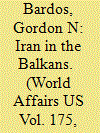| Srl | Item |
| 1 |
ID:
122108


|
|
|
|
|
| Publication |
2013.
|
| Summary/Abstract |
As the possibility of an attack on Iran's nuclear facilities continues to loom over the strategic horizon, despite continued claims by the US that sanctions are weakening the mullahs' regime, there is increased speculation among security analysts about collateral damage from such an action. One scenario in particular that has caused concern involves a counterstrike by Iran or its allies such as Hezbollah against targets outside the Middle East. In this regard, when a suspected Hezbollah suicide bomber killed six Israeli tourists in Burgas, Bulgaria, in July, it confirmed that the Balkans were a potential front for terrorism in any future conflict.
|
|
|
|
|
|
|
|
|
|
|
|
|
|
|
|
| 2 |
ID:
124149


|
|
|
|
|
| Publication |
2013.
|
| Summary/Abstract |
NATO troops are leaving Afghanistan in 2014, a quarter of a century after Soviet troops ended their occupation. How comparable are the two retreats, and will Afghans suffer fighting and destruction similar to what happened when foreign troops last left? Mikhail Gorbachev, who took the withdrawal decision in 1985, felt the war had become an expensive stalemate. The USSR opted to base its exit strategy on diplomacy and the idea that the Afghan government should pursue peace talks with its armed opponents. This emphasis on negotiations differs from Obama's policy, which remains predominantly military and rejects compromise with the Taliban. Obama and NATO claim progress on the battlefield and argue that combat duties can safely be "transitioned" to newly trained Afghans. But most Afghans are gloomy. Although they do not expect Kabul to fall to the Taliban, they believe that the insurgents will capture large parts of southern Afghanistan. Many also fear that ethnic tensions will grow throughout the country, perhaps leading to conflict between warlords from the Tajik and Uzbek minorities and the Pashtun majority.
|
|
|
|
|
|
|
|
|
|
|
|
|
|
|
|